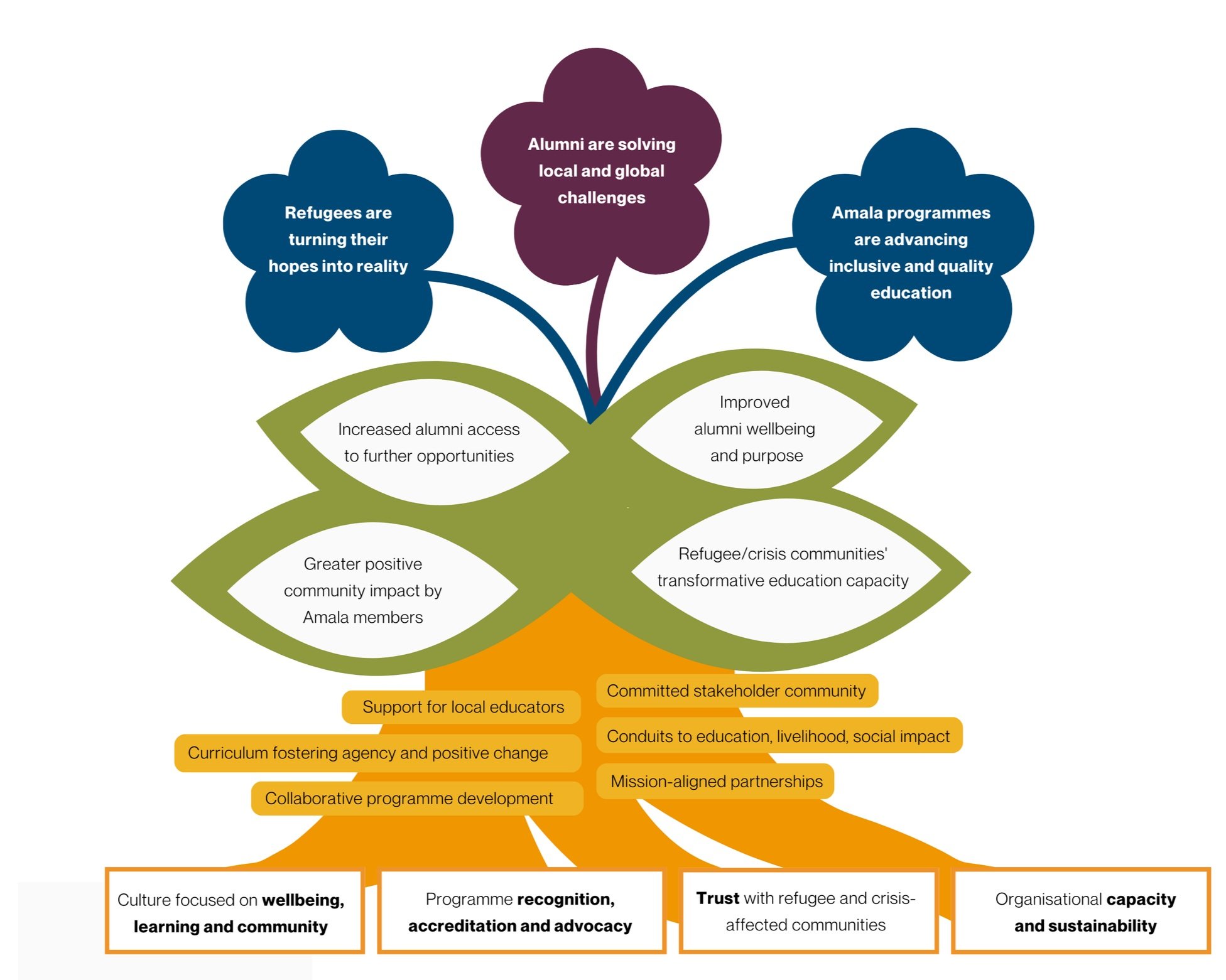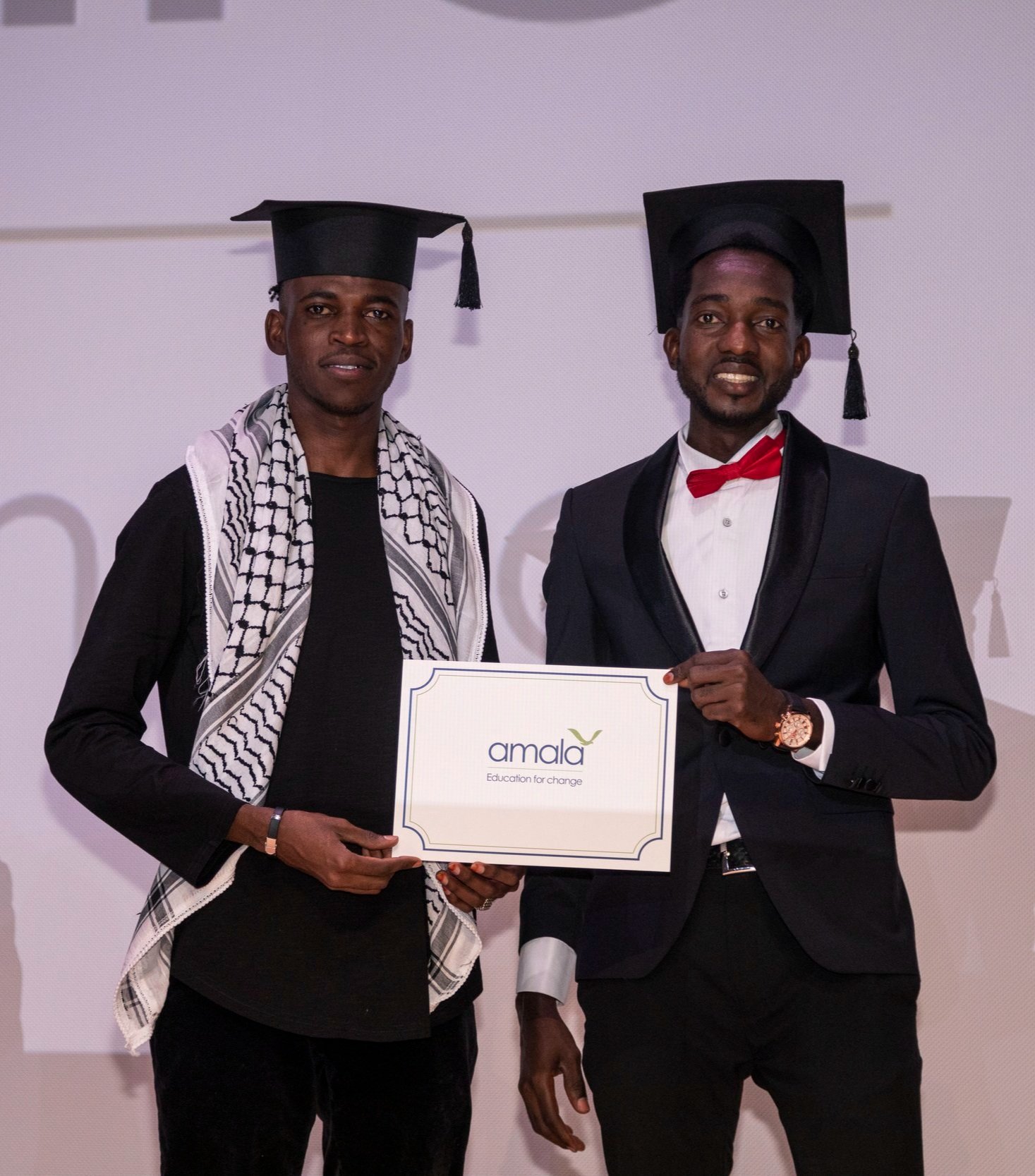
Our Impact
Fewer than one in three refugees are able to complete their secondary education and only 7% are able to access higher education. Through transformative education, Amala enables refugee and host community youth to unleash their potential and improve their lives and communities, and to drive systemic change through participation and influence.
5379
young people reached
10
countries worked in
30
partners
212
educators trained
Impact report
Find out more about our impact in our latest impact report.
Unleashing Potential and Improving Lives
Taking part in Amala programmes unleashes the potential and improves the lives of refugee youth and host community youth. 83% of alumni say that taking an Amala course helped them in their achievements since graduating and of those, 58% say that Amala “made all the difference”.
85% of Amala Changemaker Course alumni are enrolled in education six months after finishing an Amala programme, including higher education, vocational training, language classes and informal education programmes.
Alumni are also improving their livelihoods, with 30% engaged in paid work. Alumni work in a range of areas, including interpreting, protection assistance and in the hospitality sector. Some have also set up their own entrepreneurial initiatives and some work as facilitators delivering Amala programmes.
Learn about how our alumni are unleashing their potential below.
Mofti
Mofti opened his own kiosk business in Kakuma camp. Read more here.
Sura
Sura has gone on to pursue a career as a pharmacist. Read more here.
Mohamad
Mohamad received a scholarship from the Catalyst Foundation for Universal Education to study Engineering. Read more here.
“I feel privileged to have taken the course as Amala has really helped me and provided me with a new mindset where I can leave my past behind and look to my future. I believe that this is what helped me to finish my high school certificate and what has enabled me to work with UNHCR.”
- Mut, Amala Peacebuilding Alumnus
Improving communities
An Amala education not only supports individual growth, but also on students developing their capacity to create new value in their communities. 44% of alumni are leading, working or volunteering on entrepreneurial initiatives and social projects six months after graduating. Some continue to work on social impact projects they have started during their studies, others are volunteering to teach others English and Arabic, while others are contributing to peace-building initiatives in the community.
Learn about how our alumni are improving communities below.
Mut
Mut has volunteered with Lutheran World Federation, the UNHCR and other agencies supporting refugees with disabilities. Read more here.
Fatima
Fatima is now working as an Amala Facilitator for the Amala Global Secondary Diploma in Amman. Read more here.
Siham
Siham has launched an initiative to address gender inequalities in Kakuma camp. Read more here.
“Amala has helped me to recognise my abilities, to know more about the things that I can do. Moreover, being a part of the Amala community has helped me to know many amazing people who share my ambitions and this made it easier to find opportunities.”
- Fatima, Amala Ethical Leadership Alumna
Driving systemic change
Increasingly, Amala students and alumni are influencing wider systems on youth and education matters, impacting the lives of many other young people around the world. Alumni are serving as representatives on bodies and forums that inform policy around refugee education, as well as advocating for refugees and disadvantaged youth to access high quality education, entrepreneurial, and job opportunities. Current students are also taking part in forums to shape global education policy.
Learn about how our alumni are driving systemic change below.
Ahmad, Mohammad & Ahmed
Amala students are involved in OECD discussions around the future of education. Their collective voices are contributing to the changing of policies in educational systems. Read more here.
"It is crucial that refugees are given a seat at the table as there can never be an
effective solution without involving the community that has been affected."
- Nhial, Amala Peacebuilding Alumnus
Our Theory of Change
Meet our Alumni
Learn more about the impact of their Amala education, what they have done since completing their courses, and their hopes for the future.
Help us extend our impact
A few things you can do:
Partner with us to bring Amala programmes to your community
Offer education and employment opportunities for Amala students
Give or fundraise to enable us to impact more students












